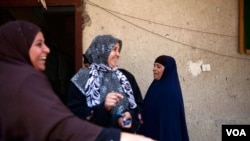KAFR KANDIL, Egypt - Official results from Egypt's historic presidential election are not expected until next week, but early speculation after the first two-day round is showing a race too close to call. The rural vote appears as divided as it is elsewhere.
As Egyptians await the results of their first truly open presidential election, fault lines between Islamists and old guard secularists appear to cut across the nation.
In the village of Kafr Kandil, south of Cairo, the choice plays well with the largely conservative rural vote: some seek stability in religion, others in past performance.
Many of the latter look to veteran diplomat Amr Moussa, who along with former Air Force chief Ahmed Shafik, promises a return to pre-uprising law and order, minus the corruption.
Outside the village school, which is serving as the village polling station, Shadia Ewis, a housewife and mother of five, hopes Moussa wins.
She thinks he's a "respectable man" who "could control the country."
Her friend and fellow housewife, Magda Hassan, agrees.
She says she wants Moussa to institute reforms, so that it won't be like it was under the old government, when everything was exploited.
Getting a fair shake from the government is a key concern of Islamist candidates' supporters, too. Farmer Ali Hassan Abdel Baki believes the best man for the job is the Muslim Brotherhood's Mohamed Morsi.
Sitting in the bright sunshine, his fields of tomatoes and grains behind him, Abdel Baki says "there is unfinished business." He says a lot of people are out of work, and the next leader, "with God's help, will look after the poor."
Abdel Baki says he and his friends are split between Morsi and independent Islamist Abdel Moneim Aboul Fotouh, adding he would be happy if either won.
But some fear the Islamist candidates might not get a chance - that the ruling military council could throw the vote against them.
Down the road from Abdel Baki's farm, blacksmith Suleiman Ibrahim Suleiman says that so far, the process has gone well. He takes a break from welding a gate to say there's no reason to doubt the outcome of the vote, even if some inevitably will.
He says that last year's parliamentary elections proved that voting can go ahead fairly. But he adds, smiling, "whoever fails will say it's forged and whoever wins will be happy."
For Suleiman, confidence his vote will matter is the most inspiring part of this election.
As for the revolution that brought it about, it too has instilled a sense of empowerment, including in the conservative countryside.
Farmer Abdel Baki says he will use that newfound power even if his candidate wins.
He says, if he does a good job, that's good enough for him. But if the new president strays from the course, Abdel Baki says he will join in a new round of protests. "We'll change him and bring another one," he adds. "It's not a problem."
As Egyptians await the results of their first truly open presidential election, fault lines between Islamists and old guard secularists appear to cut across the nation.
In the village of Kafr Kandil, south of Cairo, the choice plays well with the largely conservative rural vote: some seek stability in religion, others in past performance.
Many of the latter look to veteran diplomat Amr Moussa, who along with former Air Force chief Ahmed Shafik, promises a return to pre-uprising law and order, minus the corruption.
Outside the village school, which is serving as the village polling station, Shadia Ewis, a housewife and mother of five, hopes Moussa wins.
She thinks he's a "respectable man" who "could control the country."
Her friend and fellow housewife, Magda Hassan, agrees.
She says she wants Moussa to institute reforms, so that it won't be like it was under the old government, when everything was exploited.
Getting a fair shake from the government is a key concern of Islamist candidates' supporters, too. Farmer Ali Hassan Abdel Baki believes the best man for the job is the Muslim Brotherhood's Mohamed Morsi.
Sitting in the bright sunshine, his fields of tomatoes and grains behind him, Abdel Baki says "there is unfinished business." He says a lot of people are out of work, and the next leader, "with God's help, will look after the poor."
Abdel Baki says he and his friends are split between Morsi and independent Islamist Abdel Moneim Aboul Fotouh, adding he would be happy if either won.
But some fear the Islamist candidates might not get a chance - that the ruling military council could throw the vote against them.
Down the road from Abdel Baki's farm, blacksmith Suleiman Ibrahim Suleiman says that so far, the process has gone well. He takes a break from welding a gate to say there's no reason to doubt the outcome of the vote, even if some inevitably will.
He says that last year's parliamentary elections proved that voting can go ahead fairly. But he adds, smiling, "whoever fails will say it's forged and whoever wins will be happy."
For Suleiman, confidence his vote will matter is the most inspiring part of this election.
As for the revolution that brought it about, it too has instilled a sense of empowerment, including in the conservative countryside.
Farmer Abdel Baki says he will use that newfound power even if his candidate wins.
He says, if he does a good job, that's good enough for him. But if the new president strays from the course, Abdel Baki says he will join in a new round of protests. "We'll change him and bring another one," he adds. "It's not a problem."




